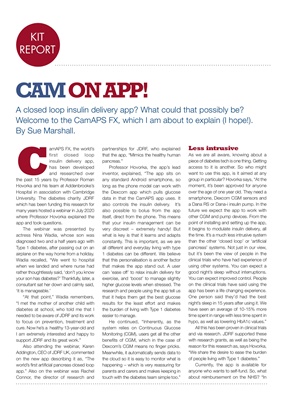
KIT
KIT
REPORT
CAM ON APP!
A closed loop insulin delivery app? What could that possibly be?
Welcome to the CamAPS FX, which I am about to explain (I hope!).
By Sue Marshall.
CamAPS FX, the world's
first closed loop
insulin delivery app,
has been developed
and researched over
the past 15 years by Professor Roman
Hovorka and his team at Addenbrooke's
Hospital in association with Cambridge
University. The diabetes charity JDRF
which has been funding this research for
many years hosted a webinar in July 2020
where Professor Hovorka explained the
app and took questions.
The webinar was presented by
actress Nina Wadia, whose son was
diagnosed two and a half years ago with
Type 1 diabetes, after passing out on an
airplane on the way home from a holiday.
Wadia recalled, "We went to hospital
when we landed and where nurse had
rather thoughtlessly said, 'don't you know
your son has diabetes?' Thankfully, later, a
consultant sat her down and calmly said,
'it is manageable.'
"At that point," Wadia remembers,
"I met the mother of another child with
diabetes at school, who told me that I
needed to be aware of JDRF and its work
to focus on prevention, treatment and
cure. Now he's a healthy 13-year-old and
I am extremely interested and happy to
support JDRF and its great work."
Also attending the webinar, Karen
Addington, CEO of JDRF UK, commented
on the new app describing it as, "The
world's first artificial pancreas closed loop
app." Also on the webinar was Rachel
Connor, the director of research and
partnerships for JDRF, who explained
that the app, "Mimics the healthy human
pancreas."
Professor Hovorka, the app's lead
inventor, explained, "The app sits on
any standard Android smartphone, so
long as the phone model can work with
the Dexcom app which pulls glucose
data in that the CamAPS app uses. It
also controls the insulin delivery. It's
also possible to bolus from the app
itself, direct from the phone. This means
that your insulin management can be
very discreet - extremely handy! But
what is key is that it learns and adapts
constantly. This is important, as we are
all different and everyday living with type
1 diabetes can be different. We believe
that this personalisation is another factor
that makes the app stand out. A user
can 'ease off' to relax insulin delivery for
exercise, and 'boost' to manage slightly
higher glucose levels when stressed. The
research and people using the app tell us
that it helps them get the best glucose
results for the least effort and makes
the burden of living with Type 1 diabetes
easier to manage.
He continued, "Inherently, as the
system relies on Continuous Glucose
Monitoring (CGM), users get all the other
benefits of CGM, which in the case of
Dexcom's CGM means no finger pricks.
Meanwhile, it automatically sends data to
the cloud so it is easy to monitor what is
happening - which is very reassuring for
parents and carers and makes keeping in
touch with the diabetes team simple too."
Less intrusive
As we are all aware, knowing about a
piece of diabetes tech is one thing. Getting
access to it is another. So who might
want to use this app, is it aimed at any
group in particular? Hovorka says, "At the
moment, it's been approved for anyone
over the age of one year old. They need a
smartphone, Dexcom CGM sensors and
a Dana RS or Dana-i insulin pump. In the
future we expect the app to work with
other CGM and pump devices. From the
point of installing and setting up the app,
it begins to modulate insulin delivery, all
the time. It's a much less intrusive system
than the other 'closed loop' or 'artificial
pancreas' systems. Not just in our view,
but it's been the view of people in the
clinical trials who have had experience of
using other systems. You can expect a
good night's sleep without interruptions.
You can expect improved control. People
on the clinical trials have said using the
app has been a life changing experience.
One person said they'd had the best
night's sleep in 15 years after using it. We
have seen an average of 10-15% more
time spent in range with less time spent in
hypo, as well as lowering HbA1c values."
All this has been proven in clinical trials
and via research. JDRF supported these
with research grants, as well as being the
reason for this research as, says Hovorka,
"We share the desire to ease the burden
of people living with Type 1 diabetes."
Currently, the app is available for
anyone who wants to self-fund. So, what
about reimbursement on the NHS? "In